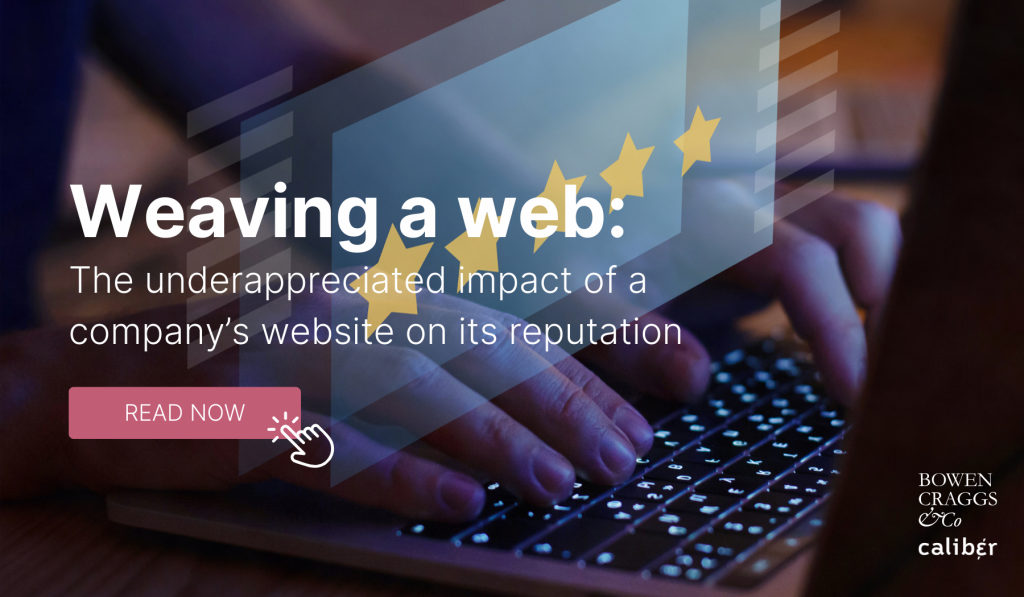

Having a corporate website used to be cool. Thirty years ago, only a handful of cutting-edge companies had one, including Apple, IBM, and Microsoft. Not anymore. Today, corporate websites are like opinions. Everyone has one (even if some are better than others).
Still, despite the widespread recognition that corporate websites are de rigueur, their impact on reputation remains underappreciated. In fact, three decades on from the dot-com dawn, companies are still making costly mistakes and letting down stakeholders — often unwittingly.
Fundamentally, a company’s website can affect its reputation in four ways.
In other words, it’s the main source of information about the company, and that’s increasingly important in a world in which fact and fiction blur and disinformation can spread like wildfire.
And as AI continues to be integrated into search engines, it will pull information about companies from prominent sources. One important consequence? Businesses need to ensure it’s their content — all present and correct on their website — that the AI bots find and prioritize.
Especially in a crisis — today more than ever, as the COVID-19 pandemic showed. In fact, companies that do so are more likely to come across as transparent and trustworthy, while those that overlook this channel — or use it poorly — do so at their peril.
Indeed, as well as leaving reputation-enhancing opportunities on the table, if they end up in the headlines for the wrong reasons, their lack of communication may allow their critics to control the narrative.
In addition to serving several functions, from HR to PR, it should house and reinforce narratives that other channels amplify, including those that underpin corporate reputation, such as messages about the company’s leadership and innovation.
All too often, though, companies see their website as a mere repository for press releases, annual reports and other information required by discrete groups of stakeholders, such as investors. Again, there are opportunity costs to neglecting the website.
The information that people find when they visit a website (and how it’s presented) shapes their perceptions. The better the information is (and the more easily it’s found), the more people tend to trust the company behind it. SEO matters in this respect, too.
If a company’s web pages appear on the first page of search engines, the more trustworthy the content — and thus the company — is seen to be.
Two recent studies shed light on the significant role a company’s website plays in shaping its reputation.
When Caliber carried out a driver analysis of the Trust & Like Scores — its chief measurement of corporate reputation — of almost 1,000 global companies to determine the relative importance of the “touchpoints” that people have with them, it found that the website is responsible for 12 percent of corporate reputation.
That’s more than corporate events and programs, sales and customer service, and social media. Only four touchpoints had more impact on reputation than the website: word of mouth, media coverage, corporate advertising and the company’s products and services, which are responsible for the largest share (16%).
In other words, what a company does has the biggest impact on reputation. But what it says and how it says it does, too, so it’s unwise to neglect touchpoints such as the corporate website.
A corporate website can also be a tool for changing minds. When Bowen Craggs measured how people felt about a company both before and after they had visited their website, it found a clear change in sentiment: 66% of visitors who already had a favorable impression of the company came away with a better one, 28% of those who had a neutral impression left with a favorable one, as did 12% of visitors who initially had an unfavorable view of the company.
In other words, a company’s website can reinforce the perceptions of its supporters, convert neutrals and reverse the opinions of naysayers. In monetary terms, Bowen Craggs estimates that each “conversion” of a neutral into a supporter equates to 10-15 euros of marketing costs, while every “turnaround” of a critic is worth as much as 25 euros. Scaled up to thousands, if not millions, of visitors and the reputation-boosting value of the corporate website is more than apparent.
First, they should consider auditing and benchmarking their entire digital estate. That will help pinpoint their website’s strengths and weaknesses in everything from key messages (does it cover the ‘who, what and how’?) and construction (how easy is it to navigate? is its design clunky and outdated or stylish and modern?) to its accuracy (does it have the right information and contact details for stakeholders such as journalists, jobseekers and customers?) and sustainability credentials (does it provide clear evidence of the company’s social impact?).
Second, companies should ask themselves if they’re putting their stakeholders first. For some, this may mean being more creative in how they design their website to make it more user-friendly.
More fundamentally, it may be about remembering who visits their site and why — from the journalist searching for a media contact to the investor reading the annual report to the customer researching options — and improving their content to meet these disparate needs.
Finally, companies should consider sharpening the messages across their digital realm, especially on their websites. The world is rife with disinformation, and far-flung crises and macro-events can affect companies and poison their reputations, whether they like it or not.
If controlling the narrative is the antidote, corporate websites are the vial. Few businesses realized that when they first launched their websites. No company can afford not to now.
Scott Payton is the CEO of Bowen Craggs. Shahar Silbershatz is the CEO and co-founder of Caliber.
© 2024 Group Caliber | All Rights Reserved | VAT: DK39314320